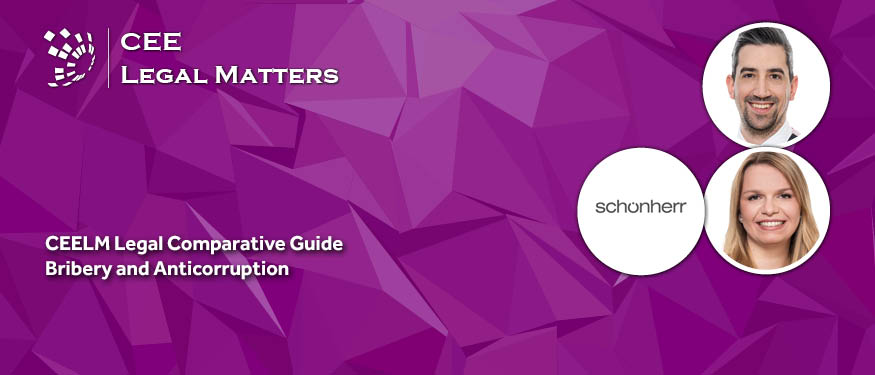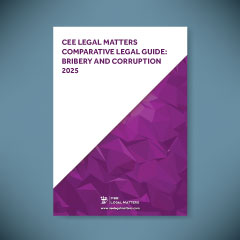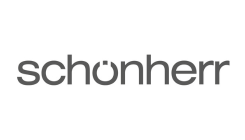Contributed by Schoenherr.
1. Legal Framework
1.1. What is the legal framework for bribery and corruption in your jurisdiction?
The main provisions of criminal law regarding corruption are outlined in Sections 302 et seq of the Austrian Criminal Code (Strafgesetzbuch), which addresses criminal offenses involving public officials, corruption, and related crimes. Additionally, Section 153a penalizes the abuse of power upon acceptance of gifts by agents and Section 265a addresses the “purchase of a mandate” (Mandatskauf), i.e., the offering of payment to party functionaries to secure a mandate in the national council, regional parliaments or the European Parliament for a person.
Furthermore, the Austrian Financial Crime Act (Finanzstrafgesetz), the Austrian Foreign Trade and Payments Act (Außenwirtschaftsgesetz), and the Austrian Federal Act against Unfair Competition (Bundesgesetz gegen den unlauteren Wettbewerb) all contain elements aimed at fighting corruption. The Austrian Corporate Liability Act (Verbandsverantwortlichkeitsgesetz) defines the responsibilities of legal entities and registered partnerships. Disciplinary measures for public officials are outlined in other legal provisions.
Lastly, the Austrian Whistleblower Protection Act (HSchG) came into force on 25 February 2023.
1.2. Which international anti-corruption conventions apply?
Austria has been actively involved in international efforts to combat corruption, having signed and ratified several key conventions. Since December 1, 2006, Austria has been a member of the Council of Europe’s Group of States against Corruption (GRECO). The country ratified the United Nations Convention against Corruption (UNCAC) dated October 31, 2003. Additionally, the OECD Convention on Combating Bribery of Foreign Public Officials in International Business Transactions was ratified by Federal Law Gazette III 176/1999.
Austria also ratified the Council of Europe’s 1999 Civil Law Convention on Corruption on August 30, 2006, and the Criminal Law Convention on Corruption dated January 27, 1999. The Convention on the Fight against Corruption Involving Officials of the European Communities or Officials of the Member States of the European Union, dated May 26, 1997, was also ratified, as was the Convention on the Protection of the European Communities’ Financial Interests dated July 26, 1995, along with its related protocols.
1.3. What is the definition of bribery?
The details of the respective provisions are complex and difficult to untangle. They can, however, be summarized as follows:
Austrian criminal law covers corruption and bribery offenses regarding public officials in Sections 304 to 308. These provisions include active and passive bribery, giving and accepting undue advantage, accepting benefits, and giving undue benefits for the purpose of interference and unlawful intervention. Active and passive bribery (Sections 304 and 307) require an unlawful execution or omission of official duties. Conversely, in case of a lawful execution or omission of official duties, the advantage given and accepted must be undue (Sections 305 and 307a). Accepting benefits or giving undue benefits for the purpose of interference, i.e., “grooming”, is penalized under Sections 306, 307b, and 308. The main aspect or difference is that it does not aim at a certain or specified act or omission. Since September 2023, a new offense, “purchase of mandate” (Section 265a) was added to the Austrian Criminal Code. Moreover, the offenses under Sections 304 and 306 used to be applicable to public officials only. However, from September 2023 on, these offenses also include future public officials, i.e., candidates for public office.
The advantage can be either material or immaterial. A material advantage is anything that from an economic point of view objectively increases the public official’s assets in a measurable way, i.e., in monetary terms. An immaterial advantage can consist of social or professional advantages, such as the promotion of a career, support for an election campaign, the awarding of honors or sexual favors.
1.4. Is private sector bribery covered by law? If yes, what is the relevant legislation?
The relevant legislation includes Sections 309 and 153a of the Austrian Criminal Code.
Section 309 of the Austrian Criminal Code intends to prevent corruption in the private sector and thus relates to such conduct in the private economic sector. Accordingly, an employee or agent of a business undertaking who, in the context of business dealings, demands, accepts, or accepts the promise of an advantage from another person for themselves or a third party in return for the exercise or omission of a legal act in violation of their duties commits the offense of “private bribery.” The same applies, of course, to anyone who offers, promises, or grants such an advantage for these reasons.
Section 153a addresses the acceptance of gifts by agents holding a position of power. Under this provision, a person is liable if they have accepted a pecuniary advantage (Vermogensvorteil) that is not merely insignificant, in return for exercising their power to manage third-party assets or to impose obligations on others. Another requirement is that the person does not remit the pecuniary advantage in violation of their duties. For the advantage to be considered “significant,” the assumption is that its value must exceed EUR 100.
1.5. What is the definition of a public official and a foreign public official? Are employees at state-owned or state-controlled enterprises treated differently? Are there official lists of public officials, offices, or state-owned or state-controlled enterprises?
The definition of a public official under Austrian law can be found in Section 74(1)(4) of the Austrian Criminal Code:
A public official includes legislative, administrative, or judicial officers as well as persons who have otherwise been entrusted with official duties. It covers all persons who undertake legislative, administrative, or judicial duties for any public body or another state or for an international organization, be it as an executive officer or employee. It also covers those who are authorized to execute official acts on behalf of a public body. In addition, public officials are also deemed to be persons who act as executive officers or employees of a government-related organization.
In addition, since 2013, bodies or employees of state-owned or state-controlled companies have also been considered public officials. A company is considered state-owned or state-controlled if it is at least 50% owned (directly or indirectly) by the state or is de facto controlled by domestic or foreign entities. Similarly, bodies or employees of companies subject to audit by the Court of Audit are considered public officials.
Persons exercising legislative, administrative, or judicial duties for another state (i.e., not Austria) or for an international organization as its organ or employee also qualify as public officials under Austrian corruption rules. Hence, persons who are active in the jurisdiction, sovereign or private sector administration and legislation of a foreign state or who exercise a comparable function for an international organization are deemed to be equivalent to an Austrian public official. So-called Unionsbeamte, i.e., members of the institutions, bodies, offices, and agencies of the European Union established under the Treaty on the Functioning of the European Union or the Treaty on the European Union, and the staff of these bodies, are also explicitly covered.
Statistics Austria (Statistik Austria), responsible for the vast majority of European and federal statistics produced within Austria, publishes all units assigned to the public sector once a year. These are all institutional units located in the economy that are subject to government control. The list can be downloaded on the website of Statistics Austria: https://www.statistik.at/statistiken/volkswirtschaft-und-oeffentliche-finanzen/oeffentliche-finanzen/oeffentliche-finanzen/oeffentlicher-sektor
1.6. Are there any regulations on political donations?
Political donations to parties in Austria are permitted under specific conditions as stipulated in Section 6 of the Austrian Parties Act (Parteiengesetz).
Parties may accept a maximum of EUR 7,500 per donor per year and a total of EUR 750,000 per calendar year.
Parties must disclose the name of the donor for donations of EUR 500 or more per year and donor and for membership fees of EUR 5,000 or more per calendar year. Contributions from organizations and committees of persons affiliated with the party must also be published, stating the name of the supporter.
Additionally, political parties are prohibited from accepting contributions from companies that are at least 10 % state-owned (directly or indirectly). Furthermore, Section 6(6)(8) and (9) of the Austrian Parties Act governs the prohibition of anonymous contributions exceeding EUR 150, as well as contributions exceeding EUR 500 when paid in cash.
1.7. Are there any defenses available?
Some of the provisions provide for specific exemptions. For example, in the case of a public official demanding, accepting, or accepting the promise of an advantage, or a person offering, promising, or granting a public official an advantage in return for the due exercise or omission of the due exercise of an official act, the advantage must be significant for it to constitute a criminal offense. Minor-value tokens of appreciation that are customary in the locality or region, with a maximum value of EUR 100 (provided they are not given regularly), are not considered significant.
Similarly, Section 308 (Prohibited Intervention) penalizes the demand, acceptance, or being promised an advantage, as well as the offer, promise or granting of an advantage, with the intention of having the recipient of the advantage exert undue influence on the decision-making of a public official. Influence is deemed to be undue if it aims to affect the exercise or omission of an official act in violation of duties or is associated with the offer, promise, or granting of an undue advantage.
Furthermore, if future public officials demand an advantage or allow themselves to be promised such an advantage they are only liable if they have actually obtained the position as a public official.
Other than that, the usual defenses under Austrian criminal law apply. Practically, most defenses are based on the argument of a lack of intent and a lack of reciprocity between advantage and act/omission.
1.8. Is there an exemption for facilitation payments?
In Austria, there is no distinct legal provision designed explicitly to address facilitation payments, apart from the examples mentioned above regarding “undue” advantages.
1.9. What are the criminal sanctions for bribery? Are there any civil and administrative sanctions related to bribery cases?
The consequences of bribery in Austria are severe and vary based on the specific provisions a perpetrator was deemed to be in breach of as well as the roles of individuals or entities involved. The highest possible penalty is for active/passive bribery if the value of the advantage exceeds EUR 300,000. In such cases, the perpetrator will be punished with a prison sentence of one to 15 years. For legal entities or associations, the maximum penalty is EUR 4,650,000 (cf. Section 4.4).
In addition to these sanctions, perpetrators (including associations) can be subject to civil claims. Such claims can already be filed within the criminal proceedings (Privatbeteiligtenanspruch). It is noteworthy that, even if a claim is not accepted by the criminal court and the victim proceeds with litigation, the civil courts are bound by the criminal court’s guilty verdict. This binding effect (Bindungswirkung) means that the conviction cannot be reviewed in subsequent civil proceedings. The convicted person cannot successfully argue in civil proceedings that the conviction was incorrect.
Additionally, a public client must exclude a contractor from participating in a procurement procedure if it is aware of a final conviction of the contractor for corruption-related offenses (or comparable criminal offenses in the country where the contractor is based).
1.10. Does the national bribery and corruption law apply beyond national boundaries?
Austrian criminal laws apply in any event to all offenses committed within Austria (Handlungsort) and if the “success” of the offense occurred in Austria (Ort des Erfolgseintritts) or if the offense or success should have occurred in Austria. Furthermore, Austrian criminal laws apply to criminal offenses committed abroad by an Austrian civil servant or public official. The same is true if the perpetrator was an Austrian national at the time of the offense or if the offense was committed in favor of an Austrian public official.
1.11. What are the limitation periods for bribery offenses?
The statute of limitations for prosecuting corruption offenses is primarily determined by the highest possible sentencing. It is important to note that certain periods, particularly those during preliminary criminal investigations, are not included in the statute of limitations.
1.12. Are there any planned amendments or developments to the national bribery and corruption law?
Significant amendments were implemented in September 2023 by the Corruption Penal Law Amendment Act 2023 (KorrStrAG 2023).
Currently, there do not appear to be any specific bribery- or corruption-related amendments or developments planned. In addition, further changes cannot be ruled out, given that corruption proceedings and related legal issues remain a hot topic in Austria.
There will be, however, changes to the Austrian Code of Criminal Procedure, which often affect white-collar crime proceedings. In particular, the Austrian lawmaker will have to revise the law on the seizure and evaluation of mobile devices and data. In December 2023, the Austrian Constitutional Court ruled that it was unconstitutional that such seizure and evaluation could have been done merely on the basis of a warrant by the Public Prosecutor’s Office, i.e., not even a decision by the court prior to the investigative measure was needed. A draft bill has already been published but has led to a widespread justice system, given that the processing of the data was supposed to be done exclusively by the Criminal Investigation Department (instead of by the Public Prosecutor’s Office – which, however, in practice often engaged the CID with such task). It remains to be seen how this will develop.
2. Gifts and Hospitality
2.1. How are gifts and hospitality treated?
The Austrian Criminal Code generally and universally prohibits the provision of advantages to public officials, regardless of their value.
However, as described in Section 1.7, certain offenses require the advantage to be undue, meaning advantages granted i) in the context of events for which there is an officially or reasonably justified interest, ii) for charitable purposes, whereas the public official must not have control over how the advantage is being utilized, and iii) for advantages that constitute customary local or regional tokens of appreciation of minimal value. It is generally accepted that such advantages valued at less than EUR 100 are not undue.
2.2. Does the law give any specific guidance on gifts and hospitality in the public and private sectors?
Cf. Section 2.1 above There is a general acceptance regarding the value of certain advantages if the specific offense requires an undue advantage.
2.3. Are there limitations on the value of benefits (gifts and hospitality) and/or any other benefit) that may be given to a government/public official? If so, please describe those limitations and their bases.
Cf. Sections 2.1 and 2.2.
2.4. Are there any defenses or exceptions to the limitations (e.g., reasonable promotional expenses)?
Cf. Sections 2.1 and 2.2.
3. Anti-Corruption Compliance
3.1. Are companies required to have anti-corruption compliance procedures in place?
Austrian criminal law does not provide for an explicit obligation to maintain a bribe-targeting compliance program.
However, the absence of such a program is crucial under the Austrian Corporate Liability Act (VbVG). A legal entity or partnership can be held responsible for a criminal offense committed by an employee if the offense was made possible or was significantly facilitated due to the failure of decision-makers to exercise necessary and reasonable care under the circumstances. This includes the omission of significant technical, organizational, or personnel measures to prevent such offenses. Consequently, it is often considered a duty of management to implement such systems.
When considering general corporate law requirements for diligent management, sanctions for regulatory violations, and the obligation to establish an internal control system, a range of duties for a company’s management emerges. These duties indicate the practical necessity of implementing a general compliance system, and failure to do so can lead to management liability.
Furthermore, specific statutory regulations provide for the mandatory implementation of compliance systems, such as the Austrian Banking Act with regard to credit institutions of significant importance.
3.2. Is there any official guidance on anti-corruption compliance?
The Austrian Criminal Code lacks provisions explicitly defining compliance programs or specifying required compliance models.
On 15 June 2023, the Austrian Federal Competition Authority (BWB) and the Austrian Federal Economic Chamber (WKO) jointly presented an information folder dedicated to cartel law and compliance. The folder includes information on how to implement an effective compliance management system. In addition, some guidance can be found in ONR 192050, a compliance management system standard issued by Austrian Standards in 2013.
3.3. Does the law protect whistleblowers reporting bribery and corruption allegations? If an EU member, was the EU Directive on Whistleblowing implemented in your jurisdiction?
In Austria, the EU Directive on Whistleblowing was implemented through the Austrian Whistleblower Protection Act (HSchG).
3.3.1. What can be reported?
The Act applies to the provision of information regarding (suspected) breaches of regulations in the areas of public procurement, financial services, product safety, traffic safety, environmental protection, food safety, animal welfare, public health, consumer protection, data protection, and corruption, among others (= material scope). The Austrian legislator has included corruption offenses (Sections 302 to 309 of the Criminal Code) within the material scope of the HSchG. However, other property offenses that are broadly considered part of corruption law are not covered by the HSchG. Therefore, for instance, a whistleblower reporting a suspicion of embezzlement or fraud is not protected under the HSchG.
3.3.2. Who is protected?
The Act protects natural persons who have acquired information on breaches in the course of their ongoing or previous professional activity and report these. This includes employees, temporary contracted workers, applicants, trainees, volunteers, the self-employed, members of management bodies (e.g. administrative board or the supervisory board), contractors from (sub )enterprises or suppliers. Protection is not limited to whistleblowers but also extends to individuals who assist in the whistleblowing process, such as works council members or colleagues, and those who may suffer adverse consequences or retaliatory actions related to the whistleblower, like close relatives.
3.3.3. What are the conditions for protection?
Whistleblowers are entitled to use the reporting procedures and to receive protection from the time of the report to a reporting channel, provided they have reasonable grounds to believe, based on the facts and information available to them, that the information they are reporting is true and falls within the scope of the HSchG.
3.3.4. What companies does the relevant legislation apply to?
The HSchG obligates legal entities in the private and public sectors with at least 50 employees to establish an internal reporting channel. Legal entities in the private sector include public limited companies, private limited companies, open partnerships, limited partnerships, and associations. Civil law partnerships and sole proprietorships, however, are not included.
4. Corporate Criminal Liability
4.1. Can corporate entities be held liable for bribery and corruption? If so, what is the nature and scope of such liability?
Cf. also Section 3.1.
The Austrian Corporate Liability Act sets out the conditions under which legal entities, registered partnerships, and European Economic Interest Groupings (associations) can be held liable for criminal offenses (without limitation to certain offenses). An association may be held liable for a criminal offense if the offense was committed to benefit the association or in breach of its specific obligations.
In addition, one of the two following conditions must be met:
- a decision-maker must have committed a wrongful and culpable act; or
- an employee must have carried out conduct corresponding to a statutory offense and the conduct of the crime was facilitated or significantly eased because decision-makers failed to exercise the care required under the circumstances (including the omission of significant technical, organizational, or personnel measures to prevent such conduct, thereby implying the absence or insufficiency of an organizational and control system).
4.2. Can a company be liable for a bribery offense committed by an entity controlled or owned by it? Are there requirements for the parent to avoid liability in these situations?
The association could be held liable if its decision-maker or employee contributed to the criminal offense committed by the direct perpetrator (and the other prerequisites as mentioned in Section 4.1 are fulfilled).
In addition, in connection with a merger or takeover, the legal successor can also be held liable for criminal offenses committed by the target company prior to this merger or takeover. The same applies to fines imposed prior to the merger or takeover (Section 10).
4.3. Can a company be liable for corrupt actions of a third-party agent engaged to help it obtain or retain business or business advantage (such as government or regulatory actions or approvals)? If so, are there measures recognized in law, enforcement, or regulatory guidance to mitigate this liability?
The answer to that question depends essentially on two aspects: i) Did the agent engage in criminal activities, i.e., did they bribe a public official (or was there an attempt to do so), and ii) if so, whether such activity was covered by the company’s intent (or by the intent acting for the company).
Regarding an employee who has committed such an act, the company could point to a functioning compliance system, training, and the lack of involvement of the decision-maker. As highlighted in Sections 3.1 and 4.1, technical, organizational, or personnel measures to prevent such conduct are a requirement for the company’s liability if the conduct was undertaken by an employee.
In this regard, it is noteworthy that, according to case law by the Austrian Supreme Court, bribery does not necessarily constitute embezzlement or abuse of power to the detriment of the company. The argument is that bribery can sometimes be economically advantageous for the company.
4.4. What are the sanctions for the corporate criminal entity?
Corporations are subject to fines measured in per diem units, which are based on the amount of the prison sentence for the specific offense committed. Regarding corruption-related crimes, the highest possible sentence is 15 years for bribery, if the value of the advantage exceeds EUR 300,000. As the highest possible per diem unit amounts to EUR 30,000, the highest possible penalty for a corruption-related crime amounts to EUR 4,650,000.
It is noteworthy that the penalties associated with corruption offenses have increased since the Corruption Penal Law Amendment Act 2023 (KorrStraeG 2023) came into effect on September 1, 2023. Cases where the value of the advantage exceeds EUR 300,000 have been raised to be punishable by imprisonment for one to 15 years. Under the Corporate Liability Act (VbVG), the maximum daily rate has been raised from EUR 10,000 to EUR 30,000.
5. Criminal Proceedings for Bribery and Corruption Cases
5.1. What authorities can prosecute corruption crimes?
In Austria, the prosecuting bodies responsible for handling corruption offenses are primarily the Public Prosecutor’s Office for Economic Crime and Corruption (WKStA) and the Federal Bureau of Anti-Corruption (BAK). The latter is an institution under the Ministry of the Interior responsible for nationwide efforts to prevent, preempt, and combat corruption. It collaborates closely with the WKStA and assumes a central role in security and criminal police cooperation with foreign and international anti-corruption entities.
In essence, the WKStA is competent to investigate corruption offenses (except for abuse of office), white-collar criminal cases with damages exceeding EUR 5 million, and so-called “accounting fraud offenses” at larger companies. Since September 1, 2012, the WKStA has also been responsible for criminal financial offenses with damages exceeding EUR 5 million. It is the only prosecutor’s office with nationwide jurisdiction for economic and corruption offenses.
In the absence of such cases, the “normal” Public Prosecutor’s Offices are responsible for investigating and prosecuting corruption crimes.
5.2. Is there a legal obligation to report bribery and corruption cases? If so, to whom does it apply and what are the sanctions for failing to meet such an obligation?
There is no general legal obligation for individuals or businesses to report breaches of anti-bribery and anti-corruption regulations.
A managing director who is aware of a planned or ongoing criminal offense and fails to take action, despite having the ability to do so, could be considered complicit in the offense due to their inaction (Section 2).
If an authority becomes aware of a suspected criminal offense within its sphere of action (Wirkungsbereich), it is required to report the matter to the criminal prosecution authorities.
5.3. Is there any civil or administrative enforcement against corruption crimes?
Victims can pursue civil claims for damages resulting from such offenses both within the criminal proceedings as well as within litigation.
Public-sector employees (particularly civil servants) must additionally anticipate disciplinary action.
Administrative law is enforced by various administrative authorities, often entrusted with specific tasks and thus with specific competence. For example, the Financial Market Authority (FMA) oversees banks, insurance companies, and enterprises listed on the Vienna Stock Exchange, and the Federal Competition Authority (BWB) conducts investigations into possible violations of national and European competition law.
On January 1, 2013, the Austrian Lobbying and Interest Representation Transparency Act came into force. The purpose of this Act is to create clear conditions for activities intended to influence government decision-making processes. It provides for administrative penalties of up to EUR 20,000 (up to EUR 60,000 for repeated offenses) and other legal sanctions, such as deletion from the list or nullity of contracts.
5.4. What powers do the authorities have generally to gather information when investigating corruption crimes?
The Public Prosecutor’s Office oversees the preliminary investigations. It can conduct these investigations itself or, as is usually the case, delegate certain steps to the criminal police. The Austrian Code of Criminal Procedure allows for various investigative measures such as house searches, the seizure of documents and data, the monitoring of telephone conversations, the interrogation of testimonies, etc. Pursuant to Section 78, the Public Prosecutor’s Office is entitled to make direct use of the assistance of all federal, provincial, and municipal authorities and public agencies as well as other bodies and institutions under public law (Amtshilfe). Such requests must be complied with as soon as possible.
Essentially, such steps can be challenged by suspects by various means. However, the Austrian Code of Criminal Procedure does not provide for a doctrine similar to the fruit of the poisonous tree doctrine. Moreover, under Austrian law, the violation of a prohibition on obtaining evidence (Beweisgewinnungsverbot) does not always or automatically entail a prohibition on the use of the evidence thus obtained (Beweisverwertungsverbot).
5.5. Is there any form of leniency law in your jurisdiction, allowing a party to a bribery or corruption crime to voluntarily confess to the crime in exchange for a release from liability or reduction of the penalty?
Under Austrian law, the Code of Criminal Procedure offers protection for crown witnesses (Kronzeuge). Section 209a provides leniency for perpetrators who remorsefully confess to the offense and disclose knowledge or evidence that either contributes to the clarification of the offense beyond their own level of participation or helps to uncover another person involved in the offense. To avail themselves of these protections, the perpetrator must voluntarily contact the prosecution authorities.
To benefit from the leniency program, it is crucial to self-report before the criminal prosecution becomes aware of the alleged misconduct. The disclosure should include all companies and individuals who are to benefit from the leniency program.
This provision expressly applies to corporations as well (Section 19 of the Austrian Corporate Liability Act).
In practice, the program is hindered by issues of unforeseeability and delays in decision-making. In certain white-collar crime or corruption cases, requests to obtain the status of a crown witness have been left unresolved for months or even years.
5.6. Can a person plea bargain in corruption cases? If so, how is such a process conducted?
No system of plea bargains exists in Austria.
For various criminal offenses against property (e.g., breach of trust, money laundering), the perpetrator’s punishability can be precluded if, before the criminal prosecution authorities have learned of their culpability, they voluntarily make full restitution of the loss caused by their actions, or contractually undertake to indemnify the injured party for the loss suffered within a particular period, and actually do so (Taetige Reue).
Under certain circumstances, the Public Prosecutor’s Office or the court can withdraw from the prosecution (Diversion). The perpetrator must meet certain conditions, such as making full restitution of losses, paying a monetary amount, or making charitable contributions. Also, the facts of the case must have been established. While a formal confession is not required and Diversion is not considered a guilty plea, requesting it implies an acceptance of responsibility for the act committed. Additionally, the perpetrator’s guilt must not be deemed serious, and the offense must not be punishable by a custodial sentence of more than five years.




















